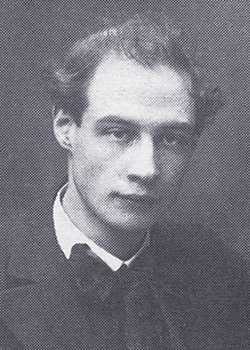John Smith Clarke

John Smith Clarke (4 February 1885 – 30 January 1959) was a British lion tamer, politician, poet, newspaper editor and art expert.
Biography
Early years
John Smith Clarke was born in Jarrow to a family whose father was ticket and poster writer in Heaton Park Road South. Clarke had a great interest in the circus, and by the age of seventeen would visit the lion tamer and enter the lions cage, something he continued to do for the remainder of his life. While mostly a writer, he also became a sailor, and was able to travel the world, being involved in gun running to revolutionaries in Russia, and once attempting to hitchhike home to Jarrow from Durban.[1]
Political career
Clarke also became a socialist, and joined the Socialist Labour Party.[1] He edited the party newspaper, The Socialist, from 1913 to 1914, and again for a period during World War I,[2] while also contributing to journals such as Forward and Plebs.[1]
Clarke opposed World War I, and wrote articles and poems decrying it. The Scottish Workers' Committee, successor of the Clyde Workers' Committee, sent him as a delegate to the Second Congress of the Communist International.[1] He attended the Congress, but was not made a voting delegate.[3] While there, he cured Lenin's dog of an illness, and received a photograph of Lenin signed "To Comrade Clarke, Vladimir Oulianoff 6.8.1920". On his return to the UK, Clarke recounted his experiences in Pen Pictures of Russia under the `Red Terror`.[1][4]
In the 1920s, Clarke joined the Independent Labour Party (ILP) and was elected to the Glasgow Corporation. He was also made a Fellow of the Society of Antiquaries of Scotland. He was elected as the Labour Party MP for Glasgow Maryhill at the 1929 UK general election, and spent much of his time in Parliament writing humorous epitaphs for political opponents, including Ramsay MacDonald. He lost his seat at the 1931 UK general election and left the ILP in 1932 when it disaffiliated from the Labour Party.[1] In the same year, he was in the news for missing jury service after being stranded on Ailsa Craig.[5]
Later life
During the 1930s, Clarke became more involved with the arts, with a particular interest in Renaissance art. He was a member of the Royal Fine Art Commission for Scotland, a trustee of the Scottish National Portrait Gallery and a board member of the Glasgow School of Art. He also served as a magistrate, and in 1941 was re-elected to the Glasgow Corporation, serving until 1951.[1] In his spare time, Clarke served as President of the Burns Federation,[6] was consulted by museums for his knowledge of medieval weaponry, and compiled a Scottish encyclopaedia.[7]
Death and legacy
John S. Clarke died on 30 January 1959. He was 73 years old at the time of his death.
See also
Footnotes
- ↑ 1.0 1.1 1.2 1.3 1.4 1.5 1.6 "Clarke, John Smith", Oxford Dictionary of National Biography
- ↑ Raymond Challinor, The Origins of British Bolshevism, p.111
- ↑ James W. Hulse, The forming of the Communist International, p.196
- ↑ John Smith Clarke. Pen Pictures of Russia under the `Red Terror`, Glasgow : National Workers' Committees. 1921
- ↑ "Ex-M.P. missing from jury call", The Scotsman, 14 July 1932
- ↑ "The Burns Federation: Diamond Jubilee Conference", The Scotsman, 10 September 1945
- ↑ "John Clarke died; Scottish author", New York Times, 1 February 1959
Works
- Satires, Lyrics and Poems (Chiefly Humorous). Glasgow: Socialist Labour Press, 1919.
- Pen Pictures of Russia under the "Red Terror": Reminiscences of a Surreptitious Journey to Russia to Attend the Second Congress of the Third International. Glasgow: National Workers' Committees, 1921.
Further reading
- Raymond Challinor, John S. Clarke: Parliamentarian, Poet, Lion-Tamer. London, Pluto Press, 1977.
- Raymond Challinor, The Origins of British Bolshevism. London: Croom Helm, 1977.
- Adam Hochschild, To End All Wars: A Story of Loyalty and Rebellion. Boston: Houghton Mifflin Harcourt, 2011.
| Parliament of the United Kingdom | ||
|---|---|---|
| Preceded by James Brown Couper |
Member of Parliament for Glasgow Maryhill 1929–1931 |
Succeeded by Douglas Jamieson |
|